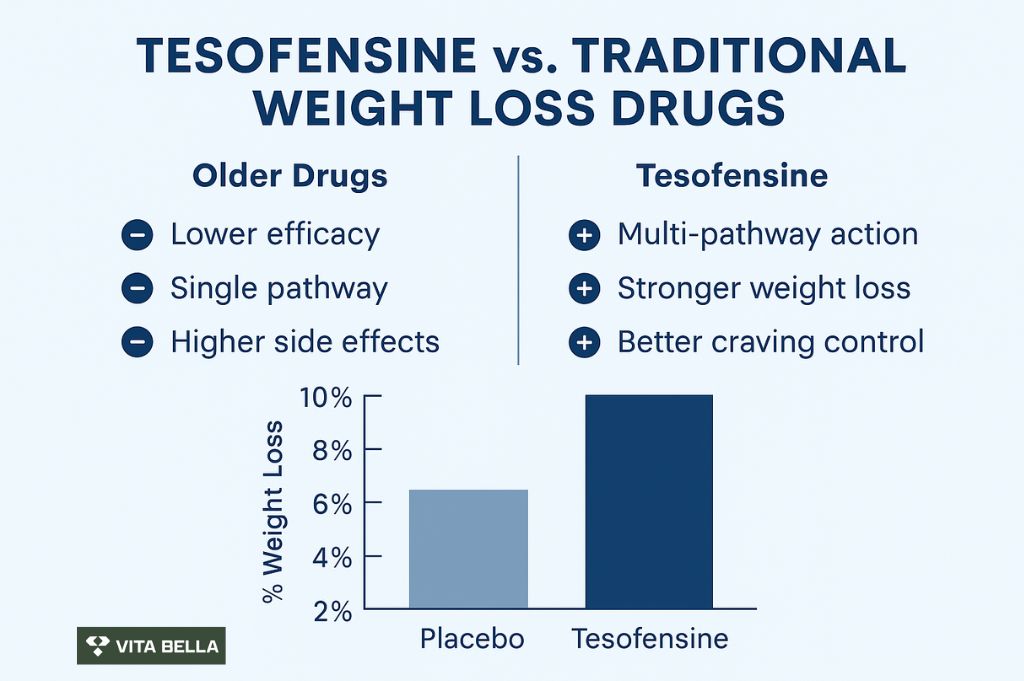What if one capsule could help you lose weight, suppress cravings, and transform your metabolism more effectively than many older drugs? That’s the promise behind tesofensine, a therapy that is gaining attention as a new medication to facilitate weight management. Clinical studies 1 suggest it can achieve significantly greater weight loss compared to existing options, while also controlling appetite and cravings.
Weight loss isn’t just about eating less, it's about controlling cravings and boosting results safely. That’s why Vita Bella is educating about Tesofensine, as a treatment option due to data supporting its ability to potentially accelerate fat loss and improve appetite control. When combined with tailored nutrition and lifestyle coaching, it empowers you to finally achieve the transformation you’ve been striving for.
What is Tesofensine?
Tesofensine 2 is a triple monoamine reuptake inhibitor that blocks the reuptake of dopamine, norepinephrine, and serotonin. Originally studied for the treatment of neurodegenerative disorders, it showed remarkable effects on appetite suppression and weight reduction. Unlike traditional appetite suppressants, tesofensine works centrally in the hypothalamus, the brain region responsible for regulating hunger and satiety.
Why is Tesofensine Promising vs Older Obesity Drugs?
Tesofensine’s impact is notable when compared to existing pharmacotherapies. In randomised controlled trials 1, tesofensine at 0.5 mg achieved approximately 10% body weight reduction in 24 weeks, outperforming many other approved obesity medications.
Unlike traditional weight loss stimulants 3 or older appetite suppressants, it reduces energy intake primarily through central appetite regulation, rather than only increasing energy expenditure. Its oral dosing also makes it easier to use compared to injectable weight loss therapies.
What is the Mechanism of Action of Tesofensine?
Tesofensine inhibits the reuptake of three key neurotransmitters: dopamine, norepinephrine, and serotonin. This leads to increased satiety, reduced food cravings, and enhanced control of eating behaviour.
Dopamine effect: improves reward control, reducing hedonic overeating.
Norepinephrine effect: increases energy expenditure and attention to satiety cues.
Serotonin effect: stabilises mood and reduces emotional eating.
Together, these pathways explain why patients on tesofensine not only lose weight but also report less desire for high-calorie foods.
What is the clinical evidence available about Tesofensine?
In a pivotal Phase IIb trial 1 involving 203 obese patients, those on tesofensine 0.5 mg lost 10.6 kg (≈approximately 10% of body weight) in 24 weeks, compared with 2.2 kg in the placebo group.
Another study 4 confirmed that after 26 weeks, tesofensine produced substantial weight loss and appears to offer greater maximum weight-reducing potential compared to currently available anti-obesity medications. These results highlight tesofensine as one of the most effective oral pharmacotherapies for obesity under clinical investigation.
What are the Benefits & Advantages of Tesofensine?
Tesofensine delivers superior weight loss compared to many existing therapies. Its unique triple-action mechanism helps suppress appetite, reduce cravings, and improve satiety, making it easier to stick to a healthy diet.
Strong Weight Loss Potential: Tesofensine has consistently achieved 2–3 times greater weight reduction than placebo in human trials.
Craving Suppression & Reduced Food Intakes: Patients experience fewer cravings for high-calorie foods and better control over portion sizes.
Oral Dosing: Unlike GLP-1 receptor agonists that require injections, tesofensine is taken orally, increasing accessibility and adherence.
Synergy with Lifestyle: Tesofensine is most effective when combined with a balanced diet and regular exercise, underscoring its role as part of a comprehensive weight loss plan.
What are Nutritional and Lifestyle Synergies?
Tesofensine’s weight loss effects are strongest when paired with healthy lifestyle strategies. A protein-rich diet helps preserve lean muscle during rapid fat loss, while fiber intake improves satiety and supports digestive health.
Nutrition and exercise are vital to maximise tesofensine’s results and minimise risks. A protein-rich diet helps preserve lean mass during weight loss.
Fiber-rich foods improve satiety and digestion, while smaller, structured meals support appetite control.
Resistance training builds muscle, supports metabolic rate, and complements weight loss, making tesofensine therapy more effective overall.
Is Tesofensine a New Era in Obesity Treatment?
Tesofensine therapy represents a revolutionary step forward in obesity treatment. By targeting multiple neurotransmitter pathways, it delivers superior weight loss, powerful craving control, and improved adherence compared to older drugs.
While ongoing research 1 is still needed to confirm long-term safety, the evidence to date highlights its immense potential. Combined with nutrition and exercise, tesofensine could redefine how patients achieve lasting weight loss and metabolic health.
Redefine What’s Possible in Weight Loss with Vita Bella
If losing weight feels like a constant battle, you’re not alone. Cravings and slow results sabotage countless journeys. Unlike traditional drugs, tesofensine works on multiple brain pathways for superior control. With our holistic approach, you’ll not only lose weight you’ll keep it off and regain confidence. Vita Bella offers many weight loss therapies like semaglutide, tirzepatide, and more.

FAQs
What is Tesofensine and how does it work?
Tesofensine is a triple monoamine reuptake inhibitor that targets dopamine, norepinephrine, and serotonin pathways in the brain. By regulating these neurotransmitters, it suppresses appetite, reduces cravings, and helps patients achieve significant weight loss more effectively than older therapies.
How much weight can patients expect to lose with Tesofensine?
Clinical trials have shown that patients taking tesofensine 0.5 mg lost around 10% of their body weight in just 24 weeks, compared to much smaller reductions in placebo groups. This makes it one of the most effective oral weight loss therapies studied so far.
Is Tesofensine safe to use long-term?
Yes, current studies confirm strong short- to medium-term results with manageable side effects, such as mild increases in heart rate and blood pressure. However, larger long-term trials are still needed to evaluate safety over several years fully.
How can nutrition and lifestyle improve Tesofensine results?
Tesofensine works best when combined with a supportive lifestyle. A protein- and fiber-rich diet, structured meal timing, and regular resistance training preserve muscle, boost metabolism, and enhance fat loss.
References:
Bello, N. T., & Zahner, M. R. (2009). Tesofensine, a monoamine reuptake inhibitor for the treatment of obesity. Current Opinion in Investigational Drugs, 10(10), 1105-1116. https://pubmed.ncbi.nlm.nih.gov/19777399/
Perez, C. I., Luis-Islas, J., Lopez, A., Diaz, X., Molina, O., Arroyo, B., Moreno, M. G., Gil Lievana, E., Fonseca, E., Castañeda-Hernández, G., & Gutierrez, R. (2024). Tesofensine, a novel antiobesity drug, silences GABAergic hypothalamic neurons. PLOS ONE, 19(4), e0300544. https://doi.org/10.1371/journal.pone.0300544
Doggrell, S. A. (2009). Tesofensine—A novel potent weight loss medicine. Expert Opinion on Pharmacotherapy, 10(1), 135–142. https://doi.org/10.1517/14656560802584146





















